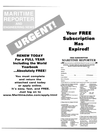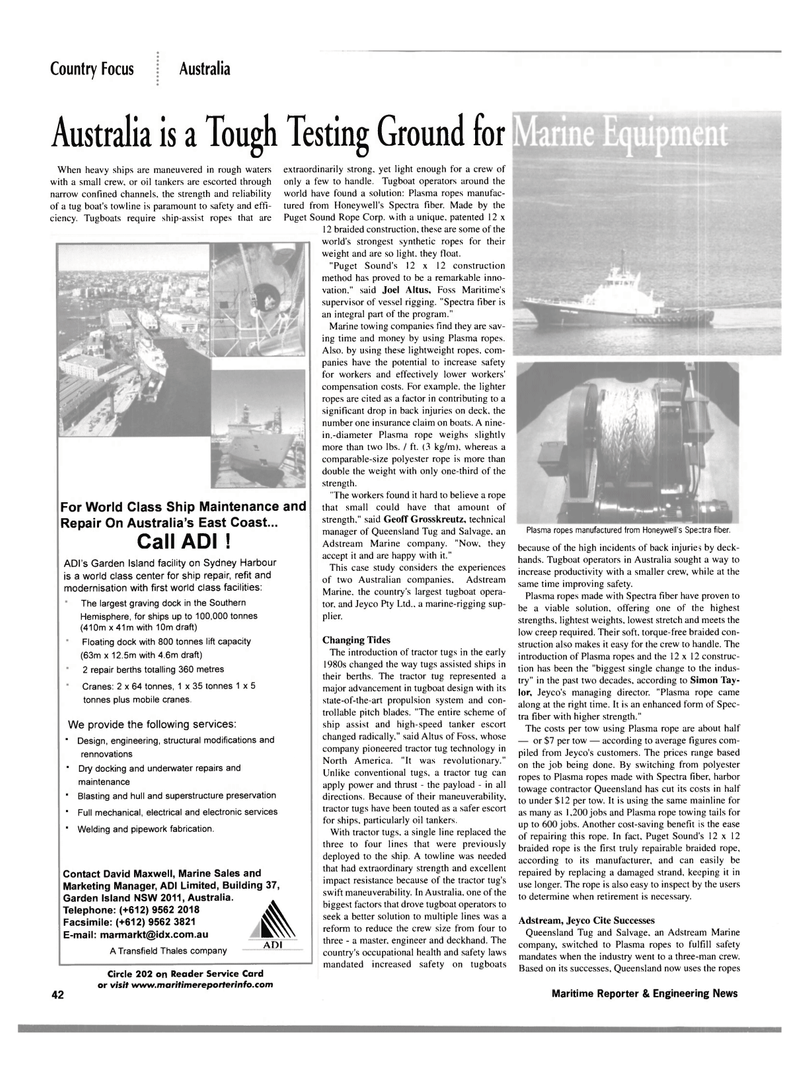
Page 45: of Maritime Reporter Magazine (January 2002)
Read this page in Pdf, Flash or Html5 edition of January 2002 Maritime Reporter Magazine
Country Focus Australia
Australia is a Tough Testing Ground for
When heavy ships are maneuvered in rough waters with a small crew, or oil tankers are escorted through narrow confined channels, the strength and reliability of a tug boat's towiine is paramount to safety and effi- ciency. Tugboats require ship-assist ropes that are
For World Class Ship Maintenance and
Repair On Australia's East Coast...
Call ADI !
ADI's Garden Island facility on Sydney Harbour is a world class center for ship repair, refit and modernisation with first world class facilities:
The largest graving dock in the Southern
Hemisphere, for ships up to 100,000 tonnes (410m x 41 m with 10m draft)
Floating dock with 800 tonnes lift capacity (63m x 12.5m with 4.6m draft) 2 repair berths totalling 360 metres
Cranes: 2 x 64 tonnes, 1 x 35 tonnes 1 x 5 tonnes plus mobile cranes.
We provide the following services: " Design, engineering, structural modifications and rennovations " Dry docking and underwater repairs and maintenance " Blasting and hull and superstructure preservation • Full mechanical, electrical and electronic services " Welding and pipework fabrication. extraordinarily strong, yet light enough for a crew of only a few to handle. Tugboat operators around the world have found a solution: Plasma ropes manufac- tured from Honeywell's Spectra fiber. Made by the
Puget Sound Rope Corp. with a unique, patented 12 x 12 braided construction, these are some of the world's strongest synthetic ropes for their weight and are so light, they float. "Puget Sound's 12 x 12 construction method has proved to be a remarkable inno- vation." said Joel Altus. Foss Maritime's supervisor of vessel rigging. "Spectra fiber is an integral part of the program."
Marine towing companies find they are sav- ing time and money by using Plasma ropes.
Also, by using these lightweight ropes, com- panies have the potential to increase safety for workers and effectively lower workers' compensation costs. For example, the lighter ropes are cited as a factor in contributing to a significant drop in back injuries on deck, the number one insurance claim on boats. A nine- in.-diameter Plasma rope weighs slightly more than two lbs. / ft. (3 kg/m). whereas a comparable-size polyester rope is more than double the weight with only one-third of the strength. "The workers found it hard to believe a rope that small could have that amount of strength." said Geoff Grosskreutz, technical manager of Queensland Tug and Salvage, an
Adstream Marine company. "Now, they accept it and are happy with it."
This case study considers the experiences of two Australian companies. Adstream
Marine, the country's largest tugboat opera- tor. and Jeyco Pty Ltd.. a marine-rigging sup- plier.
Contact David Maxwell, Marine Sales and
Marketing Manager, ADI Limited, Building 37,
Garden Island NSW 2011, Australia.
Telephone: (+612) 9562 2018
Facsimile: (+612) 9562 3821
E-mail: [email protected]
ADI 4
ATransfield Thales company 42
Circle 202 on Reader Service Card or visit www.maritimereporterinfo.com
Changing Tides
The introduction of tractor tugs in the early 1980s changed the way tugs assisted ships in their berths. The tractor tug represented a major advancement in tugboat design with its state-of-the-art propulsion system and con- trollable pitch blades. "The entire scheme of ship assist and high-speed tanker escort changed radically," said Altus of Foss, whose company pioneered tractor tug technology in
North America. "It was revolutionary."
Unlike conventional tugs, a tractor tug can apply power and thrust - the payload - in all directions. Because of their maneuverability, tractor tugs have been touted as a safer escort for ships, particularly oil tankers.
With tractor tugs, a single line replaced the three to four lines that were previously deployed to the ship. A towiine was needed that had extraordinary strength and excellent impact resistance because of the tractor tug's swift maneuverability. In Australia, one of the biggest factors that drove tugboat operators to seek a better solution to multiple lines was a reform to reduce the crew size from four to three - a master, engineer and deckhand. The country's occupational health and safety laws mandated increased safety on tugboats
Plasma ropes manufactured from Honeywell's Spectra fiber. because of the high incidents of back injuries by deck- hands. Tugboat operators in Australia sought a way to increase productivity with a smaller crew, while at the same time improving safety.
Plasma ropes made with Spectra fiber have proven to be a viable solution, offering one of the highest strengths, lightest weights, lowest stretch and meets the low creep required. Their soft, torque-free braided con- struction also makes it easy for the crew to handle. The introduction of Plasma ropes and the 12 x 12 construc- tion has been the "biggest single change to the indus- try" in the past two decades, according to Simon Tay- lor, Jeyco's managing director. "Plasma rope came along at the right time. It is an enhanced form of Spec- tra fiber with higher strength."
The costs per tow using Plasma rope are about half — or $7 per tow — according to average figures com- piled from Jeyco's customers. The prices range based on the job being done. By switching from polyester ropes to Plasma ropes made with Spectra fiber, harbor towage contractor Queensland has cut its costs in half to under $12 per tow. It is using the same mainline for as many as 1,200 jobs and Plasma rope towing tails for up to 600 jobs. Another cost-saving benefit is the ease of repairing this rope. In fact, Puget Sound's 12x12 braided rope is the first truly repairable braided rope, according to its manufacturer, and can easily be repaired by replacing a damaged strand, keeping it in use longer. The rope is also easy to inspect by the users to determine when retirement is necessary.
Adstream, Jeyco Cite Successes
Queensland Tug and Salvage, an Adstream Marine company, switched to Plasma ropes to fulfill safety mandates when the industry went to a three-man crew.
Based on its successes, Queensland now uses the ropes
Maritime Reporter & Engineering News

 44
44

 46
46
